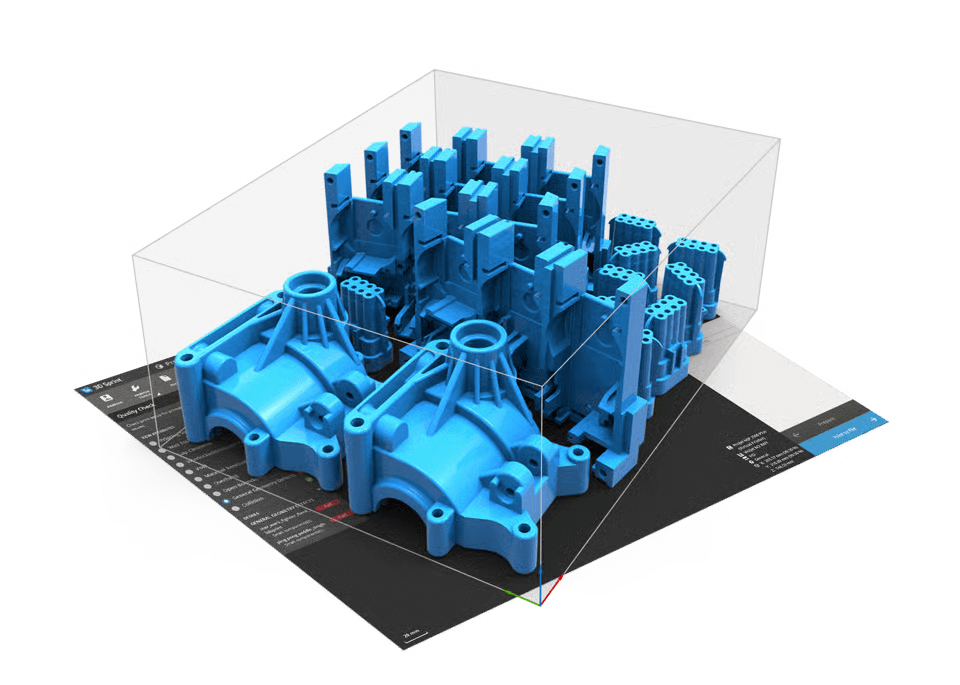3D Systems (NYSE: DDD) is narrowing its software strategy, choosing to concentrate on polymer production and artificial intelligence (AI), while divesting two major platforms to Hubb Global Holdings.
The company said on September 29, 2025 that it will now focus on advancing 3D Sprint, its proprietary software for polymer 3D printing. 3D Sprint is already widely used across its large installed base and will be expanded with new AI-driven features to speed design preparation, optimize workflows, and improve part quality.

3D Systems 3D Sprint. Image courtesy of 3D Systems.
At the same time, 3D Systems has agreed to sell its Oqton Manufacturing Operating System (MOS) and 3DXpert platforms to Hubb Global Holdings. These are “printer-agnostic” software tools designed to manage additive workflows and support large, mixed fleets of machines, including metal printers from multiple OEMs.
According to 3D Systems, moving Oqton and 3DXpert into independent ownership is intended to help accelerate the adoption of production-scale metal 3D printing. Under Hubb, both platforms will continue to operate independently and serve customers worldwide.
The deal is expected to close in the fourth quarter of 2025, with Highlands Capital Advisors acting as exclusive buy-side advisor to Hubb Global Holdings. Hubb, led by Steve Lokam and Kalyan Yenneti, says it will invest in expanding sales, service, and infrastructure for both platforms. Little is publicly known about Hubb beyond this transaction; the company is described as an investment group focused on AI and advanced manufacturing, but it has had almost no presence in additive manufacturing news before this deal.

Oqton partners with Xact Metal to deliver new metal AM solutions. Image courtesy of Xact Metal.
3D Systems CEO Dr. Jeffrey Graves said the decision followed a comprehensive strategic review of the company’s software portfolio.
“By concentrating our internal software development resources on advancing 3D Sprint®, and continuing to support our unique application development across both polymer and metal printing solutions, with the later utilizing the 3DXpert® platform that will continue to evolve under Hubb Global Holdings’ ownership, we can best leverage both of these market-leading software systems to solve the most critical customer needs in both polymer and metal solutions,” he said.
3D Systems also said it will maintain a strategic relationship with Hubb, with 3DXpert continuing to be integrated into the company’s own metal solutions portfolio.
The company pointed out that Oqton and 3DXpert have already built strong recognition among manufacturers worldwide. Oqton’s system has been used in facilities across the U.S., Europe, and the Middle East, demonstrating applications for distributed, on-demand manufacturing. 3DXpert has become a benchmark for advanced metal printing workflows, helping OEMs and end users improve reliability and throughput.
Founded nearly 40 years ago by Chuck Hull, 3D Systems is one of the oldest and largest companies in the additive manufacturing industry. By concentrating on its core platforms and maintaining partnerships with independent software developers like Hubb, the company says it wants to drive innovation while supporting broader adoption of both polymer and metal 3D printing.
Meanwhile, this step also points to a broader pattern across the additive manufacturing industry, where established players are restructuring portfolios, spinning off assets, or making acquisitions as the market matures. Over the past 18 months, additive manufacturing has begun to see consolidation. In fact, since 2024, analysts have noted a clear trend in 3D printing, as companies are merging, selling off parts of their businesses, and narrowing their focus to areas where they’re strongest. In that context, 3D Systems’ move to sell Oqton and 3DXpert reflects the wider industry shift toward more streamlined portfolios and strategic partnerships.

